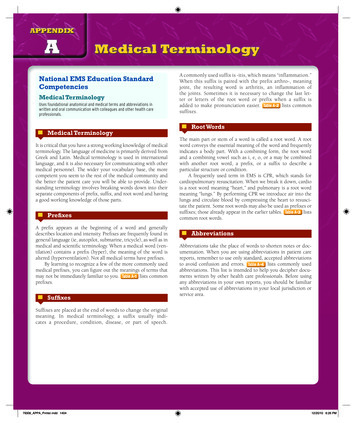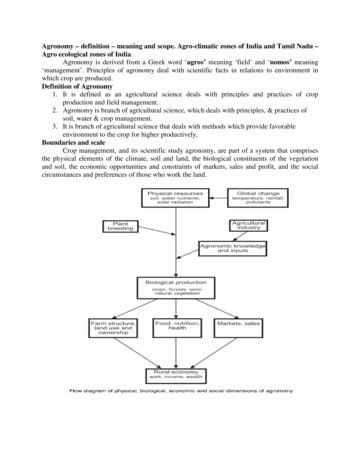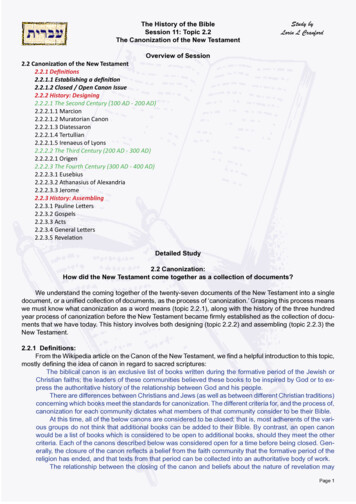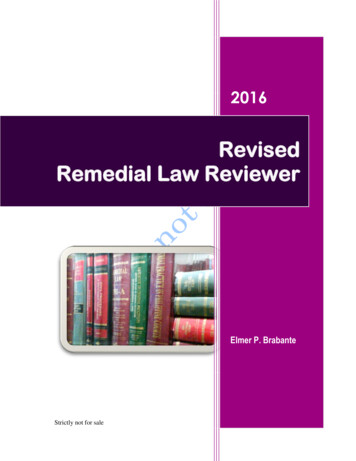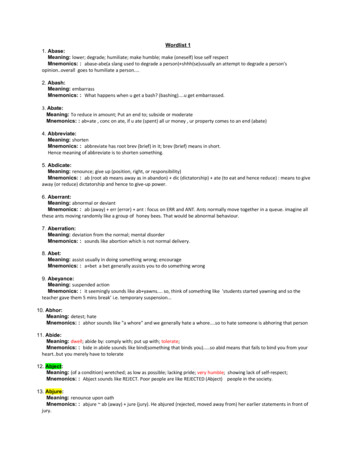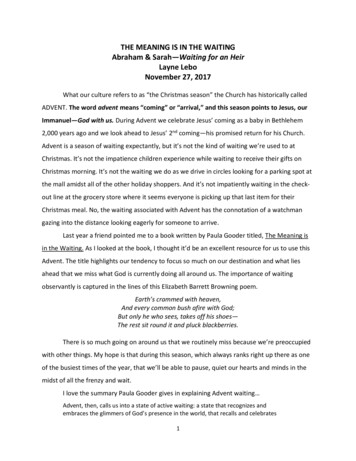
Transcription
THE MEANING IS IN THE WAITINGAbraham & Sarah—Waiting for an HeirLayne LeboNovember 27, 2017What our culture refers to as “the Christmas season” the Church has historically calledADVENT. The word advent means “coming” or “arrival,” and this season points to Jesus, ourImmanuel—God with us. During Advent we celebrate Jesus’ coming as a baby in Bethlehem2,000 years ago and we look ahead to Jesus’ 2nd coming—his promised return for his Church.Advent is a season of waiting expectantly, but it’s not the kind of waiting we’re used to atChristmas. It’s not the impatience children experience while waiting to receive their gifts onChristmas morning. It’s not the waiting we do as we drive in circles looking for a parking spot atthe mall amidst all of the other holiday shoppers. And it’s not impatiently waiting in the checkout line at the grocery store where it seems everyone is picking up that last item for theirChristmas meal. No, the waiting associated with Advent has the connotation of a watchmangazing into the distance looking eagerly for someone to arrive.Last year a friend pointed me to a book written by Paula Gooder titled, The Meaning isin the Waiting. As I looked at the book, I thought it’d be an excellent resource for us to use thisAdvent. The title highlights our tendency to focus so much on our destination and what liesahead that we miss what God is currently doing all around us. The importance of waitingobservantly is captured in the lines of this Elizabeth Barrett Browning poem.Earth’s crammed with heaven,And every common bush afire with God;But only he who sees, takes off his shoes—The rest sit round it and pluck blackberries.There is so much going on around us that we routinely miss because we’re preoccupiedwith other things. My hope is that during this season, which always ranks right up there as oneof the busiest times of the year, that we’ll be able to pause, quiet our hearts and minds in themidst of all the frenzy and wait.I love the summary Paula Gooder gives in explaining Advent waiting Advent, then, calls us into a state of active waiting: a state that recognizes andembraces the glimmers of God’s presence in the world, that recalls and celebrates1
God’s historic yet ever present actions, that speaks the truth about the almostbut-not-quite nature of our Christian living, that yearns for but cannot quiteachieve divine perfection. P. 21When I talk about waiting expectantly and eagerly anticipating, those of you who aremothers probably think about pregnancy. Pregnancy is the quintessential example of the kindof waiting we’re talking about in Advent—at least that what Paula Gooder says—as a guy I can’treally speak to that. One of the frameworks that some church traditions use for Advent—andwhich is used in The Meaning is in the Waiting—connects the 4 weeks of Advent with 4 peoplefrom Scripture: Abraham & Sarah, Isaiah & the prophets, John the Baptist and Mary, Jesus’mother. Each of these characters was waiting for a child to be born. Advent is set against thebackdrop of 4 significant births. This morning we’ll be focusing on Abraham and Sarah’s wait foran heir.Many of us are at least vaguely familiar with the story of Abraham and Sarah and thebirth of their son, Isaac, so, I’ll just give an overview of their story and then lead us in reflectingon what we can learn from their waiting. The slice of Abraham and Sarah’s story that we’ll belooking at today is found in Genesis chapters 12 through 21.For simplicity’s sake I’m going to refer to Abraham and Sarah by their most commonnames, even though initially they were known as Abram and Sarai. God changed their names toreflect the fact that they were going to be the parents of nations. We meet this couple inGenesis chapter 12 when God appears to Abraham and calls him to take everything he has andleave all that he knows to follow God to a place God would show him. This calling is especiallyremarkable when we consider that Abraham and his family were pagan idol worshipers whoworshipped a pantheon of gods and goddesses, and as far as we can tell, Abraham had neverencountered God before that time.Abraham was 75 years old and his wife, Sarah, was 65 when God called them. God toldthis couple that He would bless them and that they would be the parents of nations. He wenton to say that all people on the earth would be blessed through them. Genesis chapter 12 verse4 records Abraham’s response to God’s call with 3 simple words: “So Abraham left.” Goddirected them to the land of Canaan—the area where eventually the people of Israel wouldsettle in what became known as the Promised Land. Over the next twenty-five years Abraham2
and Sarah travelled on a roller coaster ride waiting for the fulfillment of God’s promise. Genesistells us, “Abraham believed God and it was credited to him as righteousness” (Genesis 15:6).But trusting in God wasn’t easy for Abraham and Sarah. On two separate occasions whenAbraham and Sarah were traveling through foreign countries Abraham convinced Sarah to tellanyone they met that he was her brother, because he was afraid people would be attracted toSarah and would kill him if they knew he was her husband so they could take her for their wife.Abraham put his wife Sarah in grave danger so that he could protect himself.After 10 years of waiting Abraham and Sarah decided that God needed some help withhis plan to make them parents and so they agreed that Abraham would sleep with Sarah’sservant Hagar. Hagar gave birth to a son and they named him Ishmael. So Abraham became afather at 86 years of age, but God insisted that while He would bless Ishmael, Sarah herself wasgoing to have a son. Thirteen more years of waiting passed; Abraham was now 99 and Sarahwas 89 years of age. One day Abraham and Sarah were visited by some heavenly guests and asthe guests waited for their meal, they told Abraham that one year from that time Sarah wasgoing to give birth to a son. When Sarah, who was in the tent preparing their meal, heard thisshe couldn’t help but laugh as she thought to herself, “After I am worn out and my master isold, will I now have this pleasure” (Genesis 17:12)?A year later God’s promise to Abraham and Sarah was fulfilled and they had a baby boynamed Isaac. In Genesis chapter 21 verses 1-5 we read,Now the LORD was gracious to Sarah as he had said, and the LORD did for Sarah what he hadpromised. Sarah became pregnant and bore a son to Abraham in his old age, at the very time God hadpromised him. Abraham gave the name Isaac to the son Sarah bore him. When his son Isaac was eightdays old, Abraham circumcised him, as God commanded him. Abraham was a hundred years old whenhis son Isaac was born to him. Genesis 21:1-5There is much we can learn from Abraham and Sarah about waiting and about the God whocalls us to wait on Him and with Him. At the beginning of Abraham and Sarah’s story we readthese words,The LORD had said to Abram, “Leave your country, your people and your father’s household and go tothe land I will show you. “I will make you into a great nation and I will bless you; I will make your namegreat, and you will be a blessing. I will bless those who bless you, and whoever curses you I will curse;and all peoples on earth will be blessed through you.” So Abram left, as the LORD had told him; and Lotwent with him. Abram was seventy-five years old when he set out from Haran. He took his wife Sarai, his3
nephew Lot, all the possessions they had accumulated and the people they had acquired in Haran, andthey set out for the land of Canaan, and they arrived there. Genesis 12:1-5God called Abraham to leave what was familiar and comfortable to follow God to theplace where He would lead them. It’s important that we understand what this leaving meantfor Abraham. It would have been viewed as extremely dangerous and foolish by his familymembers. Abraham and Sarah were leaving the security and the protection of their extendedfamily to set out on a journey to they didn’t know where. They were leaving all that they knewto follow a God they had apparently just met. God’s call to Abraham and Sarah was to leavewhat was familiar and comfortable to them and to trust God by going with Him.In the same way, waiting teaches us to trust in God and to go with Him as we leavewhat is familiar and comfortable to us. Our circumstances probably won’t mirror Abraham andSarah’s, but God wants to teach us to grow in our trust of Him and He often does that by pullingus away from what is familiar and comfortable so that we need to rely on Him. God’s calling forus is often a dual calling—to go with Him and to leave other things—maybe even otherpeople—behind. How many of us have put our hope and our dreams in something only to see itnot work out the way we had hoped it would? Times like that are painful, because we’veinvested energy in that reality and then when it isn’t realized we don’t know how to respondand what to do. At those moments we can push forward in trying to make something elsehappen or in lashing out about the unfairness of what didn’t occur—and those are both naturalresponses—or, we can wait. We can wait on God and see what He’ll do and what He has for us.Waiting teaches us to trust God.Another lesson we learn from Abraham and Sarah’s story comes up repeatedly, but I’lljust point to 3 scriptures.After this, the word of the LORD came to Abram in a vision: “Do not be afraid, Abram. I am your shieldyour very great reward.” But Abram said, “O Sovereign LORD, what can you give me since I remainchildless and the one who will inherit my estate is Eliezer of Damascus?” And Abram said, “You havegiven me no children; so a servant in my household will be my heir.” Genesis 15:1-3God also said to Abraham, “As for Sarai your wife, you are no longer to call her Sarai; her name will beSarah. I will bless her and will surely give you a son by her. I will bless her so that she will be the motherof nations; kings of peoples will come from her.” Abraham fell facedown; he laughed and said to himself,“Will a son be born to a man a hundred years old? Will Sarah bear a child at the age of ninety?”Genesis 17:15-174
Then the Lord said, “I will surely return to you about this time next year, and Sarah your wife will have ason.” Now Sarah was listening at the entrance to the tent, which was behind him. Abraham and Sarahwere already old and well advanced in years, and Sarah was past the age of childbearing. So Sarahlaughed to herself as she thought, “After I am worn out and my master is old, will I now have thispleasure?” Then the LORD said to Abraham, “Why did Sarah laugh and say, ‘Will I really have a child, nowthat I am old?’ Is anything too hard for the LORD? I will return to you at the appointed time next year andSarah will have a son.” Genesis 18:10-14Throughout their lives Abraham and Sarah struggled to believe that God was able toaccomplish what He said He was going to do. They limited God to what they could conceive ofas possible. They couldn’t envision a 100 year old man and a 90 year old woman having a child,so they assumed that this was impossible for God. Waiting on God reminds us not to limit Godto what we think is possible. Again, our circumstances differ from Abraham and Sarah’s, butthe lesson is the same. One of the biggest reasons why waiting on God is so hard for us is thatwe limit what God can do to what we can envision. When our preferred result doesn’t occur webecome sad or frustrated or angry, because we can’t envision something better. Frequentlywe’re not able to lock into what God is doing, because we’re stuck thinking about what wewere sure was best. An obvious example of this is in the arena of young romances. Don’t raiseyour hands, but how many of us prayed for God to give us someone as our husband or wifewho we were in a relationship with or who we hoped to be in a relationship with and then wewere devastated when that didn’t come to pass. We were sure they were THE ONE, and wecouldn’t imagine someone better. If God had answered “yes” to all those prayers, many of uswould be in a world of hurt right now.Our struggle to trust in God and take the long view in spite of what we see in theimmediate reminds me of advice parents often give to their kids. As parents, we’ve lived muchlonger and experienced more and we have a much broader perspective than our kids do. We’reable to view our kids’ lives and see that God probably has something much better than whatthey were hoping for. But when it comes to our lives, we as adults fall into the same trap; we’renot able to accept that God has something better, because we limit God to what we can see.I remind you often that I don’t preach these messages because I have a great handle onall of this stuff. If my preaching were limited to what I’ve mastered we’d cycle back to the samecouple of topics all the time. These lessons are as convicting for me as they are for you. And this5
third lesson may be the one I struggle with the most. Follow along as I read Genesis chapter 16verses 1-4:Now Sarai, Abram’s wife, had borne him no children. But she had an Egyptian maidservant namedHagar; so she said to Abram, “The LORD has kept me from having children. Go, sleep with mymaidservant; perhaps I can build a family through her.” Abram agreed to what Sarai said. So after Abramhad been living in Canaan ten years, Sarai his wife took her Egyptian maidservant Hagar and gave her toher husband to be his wife. He slept with Hagar, and she conceived. Genesis 16:1-4Uh oh! You don’t need a doctorate in psychology to figure out that this isn’t going toend well. Abraham and Sarah have been waiting for God to fulfill his promise of a son for 10years. And they’re not getting any younger—Abraham is 85 and Sarah is 75 not exactly primechild-bearing, let alone child-rearing, years. Like us, they don’t like waiting and they can’t helpbut wonder if there isn’t something they can do to help God out. So Sarah says, “Abraham,darling, I know you probably haven’t noticed, but I’m not getting any younger. Maybe we shouldhave a child through my young servant girl Hagar?” This sounds strange to us, but it was acommon practice in that culture. This wasn’t God’s plan for Abraham and Sarah. He had beenvery clear that Sarah would bear a son, but Abraham and Sarah carried out their plan and Hagargave birth to a son.Waiting on God teaches us the foolishness of trying to accomplish God’s ends throughour means. I’m an active person. I don’t like to wait. If feels so unproductive. After all theScripture does say, “God helps those who help themselves.” Actually the Bible doesn’t say thatanywhere. That’s one of those phantom verses that we try to attribute to the Bible. When itcomes to waiting on God to do what He says He will do, God doesn’t need my help, and Hedoesn’t need your help. Abraham and Sarah now had a surrogate son named Ishmael, but thiswasn’t God’s plan. And Abraham and Sarah’s rash decision created problems for theirimmediate household and problems for their family for the rest of their lives. When we try tohelp God out, instead of waiting on Him, it always turns out badly. Taking matters into our ownhands rather than waiting on God is like my family having a problem with our washing machinenot working and me deciding that rather than waiting for the repairman, I’ll just take themachine apart and see what I can do to fix it. If you know me at all, you know that’s a terribleidea. Not only won’t I be able to fix it. I’ll probably mess it up so badly that the repairman will6
struggle to fix it. And yet that’s what we often do when we get tired of waiting on God. We takematters into our hands and try to help God out, with the result that our problem that we werewaiting on God to solve gets a whole lot worse.Abraham and Sarah have so much to teach us about waiting on God. Through theirexample we learn that trusting in God means that we often have to leave what is familiar andcomfortable. We learn not to limit God to what we think is possible. And we’re reminded ofthe foolishness of trying to accomplish God’s ends through our means. Much of what we learnabout waiting from Abraham and Sarah is what not to do, but don’t forget that when it was allover God gave them a son, they became the parents of nations and they’re remembered byGod as the father and mother of faith. I take great encouragement in that. In spite of all of theirslips and falls as they sought to wait on God, Abraham and Sarah are held up for us as positiveexamples who God blessed because of their faith. So, even though I’m bad at waiting on God,there is hope for me and there is hope for you.As we walk through the hustle and bustle and craziness of the Christmas season, don’tforget that this is also Advent—a season of waiting expectantly for God to reveal Himself to us.God has things He wants to teach each of us about ourselves, about Him and about our journeywith Him as we wait expectantly on Him this Advent season. I’d like to close with these wordsfrom The Meaning is in the Waiting,“Abraham and Sarah become symbols for us not only of faith but also of waiting: of waiting as anessential part of our journey with God, of waiting being vital for the proper unfolding of God’s plan, andof waiting being as important as that for which we wait. God summons us to go out, but does not alwaystell us where to, or why for that we must wait, but we can, sometimes, discover a meaning.” p. 517
responses—or, we can wait. We can wait on God and see what Hell do and what He has for us. Waiting teaches us to trust God. Another lesson we learn from Abraham and Sarahs story comes up repeatedly, but Ill just point to 3 scriptures. After this, the word of the LORD came to Abra






